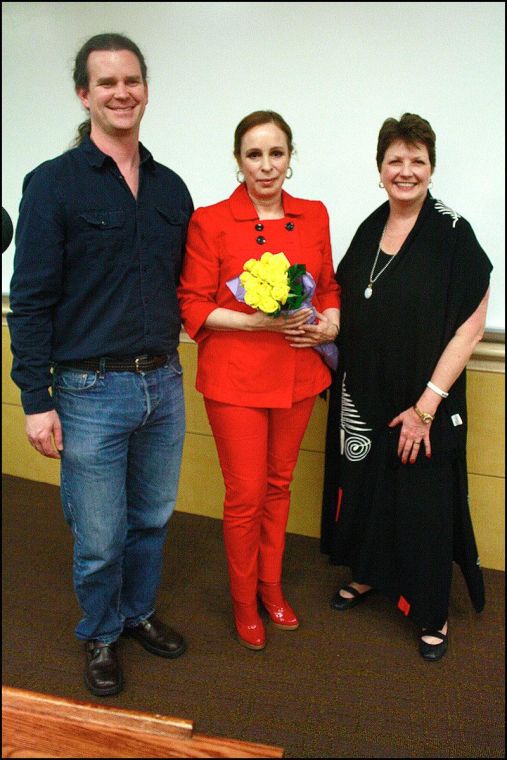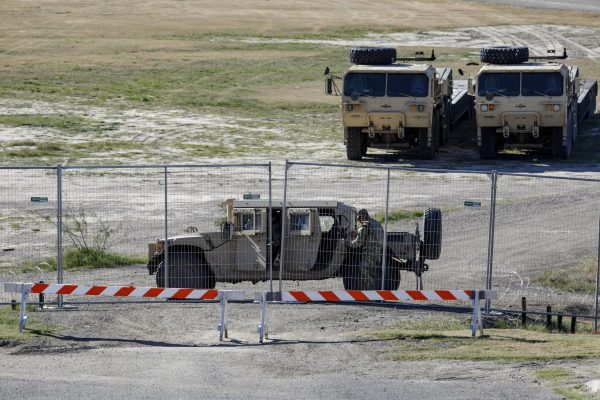Daughter of a Dictator
March 4, 2012
On Thursday, March 1, Alina Fernandez, the daughter of Fidel Castro visited Tarleton to share her personal story of growing up in Cuba. With her unique sense of humor, she revealed her inside look on Cuban politics during the 1960s and 70s and a detailed view of her father, the dictator of Cuba.
Swaying in a wooden rocking chair, with a rubber pacifier and a cloth diaper, Alina Fernandez’s eyes were glued to every movement of a Mickey Mouse cartoon. Suddenly, “Viva Cuba Libre ” meaning free Cuba thundered through the living room and Mickey Mouse was replaced with images of the executions ordered by Fidel Castro.
The date was January 1, 1959 and this was the revolution of Cuba, but it wasn’t until years later that Fernandez would find out the man leading the way, Castro, was her father.
As part of the Women’s history month event, Fernandez shared her experiences about growing up as Castro’s daughter to the students and public at Tarleton State University last Thursday. “Alina Fernandez has lived a part of history that is an interest to us all, as the daughter to Fidel Castro, she has a strangely mixed background, a combination of privileges and hardships,” Director of International Programs Dr. Marilyn Robitaille said.
Before Fernandez was born, Castro and Fernandez’s mother, Natalia Revuelta, were married to different people. Her mother was married to Dr. Orlando Fernandez and they had a daughter. When Revuelta became a part of the revolution, Castro included her in all the conspiracies of the movement from making the uniforms to hiding the rebels in her house until Castro was sent to prison.
“I think that their love began that way for sure,” Fernandez said. “Castro wrote to my mother a lot but he also wrote to his wife. One day the jailer, perhaps on purpose, mixed up the letters. Castro’s wife found out that her husband was in love with someone else. A few months later Castro was free from prison and free from marriage.”
According to the letters, Castro and Revuelta’s love grew stronger and that was when Fernandez was born. However, Fernandez grew up believing her father was Dr. Fernandez who had to flee the country with her sister when the revolution began. She described when she was 2 years old she saw a blindfolded man standing in front of a wall, his hands tied and his white shirt covered with dark spots and it took her three years to understand that she had witnessed an execution
“Even Christmas became something bad,” Fernandez said. “Anything thing good that could happen vanished, at least from my life.”
The man that replaced Fernandez’s cartoons on TV was Castro. He gave 7-12 hour-long speeches and at night he would appear at her house. “One night my mother took me out of the crib and put me in the living room in the midst of cigar smoke,” Fernandez said. “From there I could see his head lost in the blue smelly cloud, the dark hairy man of my father. His visit became a habit and in those days he would jump from the big screen to the living room just like that.”
Fernandez explained how his presence made her mother joyful but her grandmother called him the devil. “I was totally confused, I didn’t know what to think,” Fernandez said.
By the time Fernandez was 10 years old she learned that the nighttime visitor was her father, a revelation that was little surprise to her by then. “To tell you the truth I felt relieved because I didn’t have to write in my school papers that my father Dr. Fernandez and sister had ran away from the country as traitors,” Fernandez said.
Throughout her adolescence, Fernandez tried to break away from the politics of her family. She spoke of the country’s suffering as families were separated, goods were rationed and freedoms were restricted. People would come to her with petitions, problems and tragedies hoping that Fernandez could send the messages to Castro.
“Its hard trying to go to school and there’s a line in front of your house of people and what is worse is there is nothing you can do,” Fernandez said.
In 1977, Fernandez gave birth to a daughter while attempting to simultaneously become a doctor and a diplomat, which was unsuccessful. It was at this time when Fernandez joined the dissident movement, publicly defying her father’s policies.
“Revolution becomes a dictatorship when the state owns your personal life and if you try to do something to improve it you are sent to jail,” she said.
In the 90s, Fernandez stated Cuba was a horrible place to live and in 1993 she disguised herself as a Spanish tourist and escaped to the U.S. with her daughter.
In 1998, she published her story, Castro’s Daughter: An Exile’s Memoir of Cuba. Hollywood is currently making a major motion picture based on Alina’s life.
One audience member asked Fernandez if her family was happy that she published a book and she stated they were not. ” Unfortunately, in the book I published something I thought was public knowledge but it wasn’t,” Fernandez said. “I didn’t want to hurt anyone.”
Also, Fernandez mentioned to the audience she met her sister for the first time a few months ago. “She has a sad story also because Dr. Fernandez was convinced that she was going to be kidnapped so they kept moving around,” she said. “It was really a tragedy for the family.”





